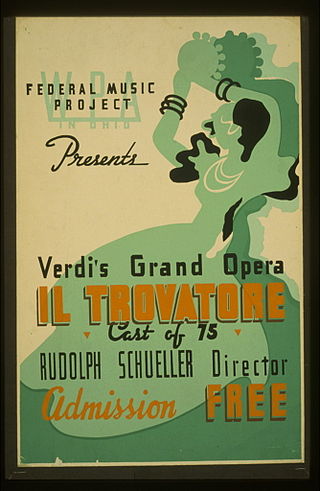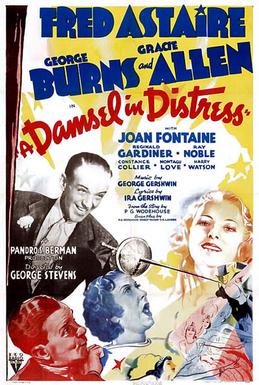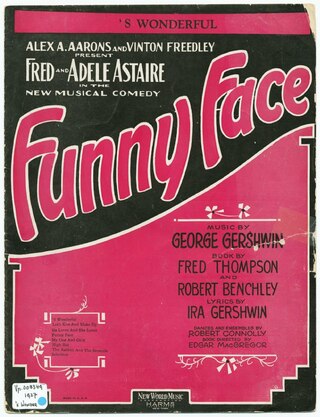Related Research Articles

This is a list of notable events in music that took place in the year 1937.

A Damsel in Distress is a 1937 American English-themed Hollywood musical comedy film starring Fred Astaire, George Burns, Gracie Allen and Joan Fontaine. Loosely based upon P.G. Wodehouse's 1919 novel of the same name and the 1928 stage play written by Wodehouse and Ian Hay, it has music and lyrics by George and Ira Gershwin. The film was directed by George Stevens, who had also directed Astaire in Swing Time (1936).
"They Can't Take That Away from Me" is a 1937 popular song with music by George Gershwin and lyrics by Ira Gershwin. It was introduced by Fred Astaire in the 1937 film Shall We Dance and gained huge success.

The Complete Ella Fitzgerald Song Books were a series of eight studio albums released in irregular intervals between 1956 and 1964, recorded by the American jazz singer Ella Fitzgerald, supported by a variety of orchestras, big bands, and small jazz combos.

Ella Fitzgerald Sings the George and Ira Gershwin Song Book is a box set by American jazz singer Ella Fitzgerald that contains songs by George and Ira Gershwin with arrangements by Nelson Riddle. It was produced by Norman Granz, Fitzgerald's manager and the founder of Verve Records. Fifty-nine songs were recorded in the span of eight months in 1959. It is one of the eight album releases comprising what is possibly Fitzgerald's greatest musical legacy: Ella Fitzgerald Sings The Complete American Songbook, in which she recorded, with top arrangers and musicians, a comprehensive collection of both well-known and obscure songs from the Great American Songbook canon, written by the likes of Cole Porter, Rodgers & Hart, Irving Berlin, Duke Ellington, George and Ira Gershwin, Harold Arlen, Jerome Kern, and Johnny Mercer.
"Oh, Lady Be Good!" is a 1924 song by George and Ira Gershwin. It was introduced by Walter Catlett in the Broadway musical Lady, Be Good! written by Guy Bolton, Fred Thompson, and the Gershwin brothers and starring Fred and Adele Astaire. The song was also performed by the chorus in the film Lady Be Good (1941), although the film is unrelated to the musical.
"Nice Work If You Can Get It" is a popular song and jazz standard composed by George Gershwin with lyrics by Ira Gershwin.
"Embraceable You" is a jazz standard song with music by George Gershwin and lyrics by Ira Gershwin. The song was written in 1928 for an unpublished operetta named East Is West. It was published in 1930 and included in that year's Broadway musical Girl Crazy, performed by Ginger Rogers in a song and dance routine choreographed by Fred Astaire.
"Let's Call the Whole Thing Off" is a song written by George Gershwin and Ira Gershwin for the 1937 film Shall We Dance, where it was introduced by Fred Astaire and Ginger Rogers as part of a celebrated dance duet on roller skates. The sheet music has the tempo marking of "Brightly". The song was ranked No. 34 on AFI's 100 Years...100 Songs.

"Fascinating Rhythm" is a popular song written by George Gershwin in 1924 with lyrics by Ira Gershwin.

"'S Wonderful" is a 1927 popular song composed by George Gershwin, with lyrics written by Ira Gershwin. It was introduced in the Broadway musical Funny Face (1927) by Adele Astaire and Allen Kearns.
"Funny Face" is a 1927 song composed by George Gershwin, with lyrics by Ira Gershwin.
"They All Laughed" is a song composed by George Gershwin, with lyrics by Ira Gershwin, written for the 1937 film Shall We Dance where it was introduced by Ginger Rogers as part of a song and dance routine with Fred Astaire.
"Slap That Bass" is a song composed by George Gershwin, with lyrics by Ira Gershwin, introduced by Fred Astaire and Dudley Dickerson in the 1937 film Shall We Dance.
"A Foggy Day" is a popular song composed by George Gershwin, with lyrics by Ira Gershwin. The song was introduced by Fred Astaire in the 1937 film A Damsel in Distress. It was originally titled "A Foggy Day " in reference to the pollution-induced pea soup fogs that were common in London during that period, and is often still referred to by the full title.
The commercial recording by Astaire for Brunswick was very popular in 1937.
"My One and Only" is a song composed by George Gershwin, with lyrics by Ira Gershwin, written for the 1927 musical Funny Face where it was introduced by Fred Astaire, Betty Compton and Gertrude McDonald. It was originally titled "(What Am I Gonna Do) If You Turn Me Down?"
"(I've Got) Beginner's Luck" is a song composed by George Gershwin, with lyrics by Ira Gershwin, written for the 1937 film Shall We Dance, it was introduced by Fred Astaire. It is a brief comic tap solo with cane where Astaire's rehearsing to a record of the number is cut short when the record gets stuck. Astaire's commercial recording for Brunswick was very popular in 1937.
"He Loves and She Loves" is a 1927 song composed by George Gershwin, with lyrics written by Ira Gershwin.

"'The Half of it, Dearie' Blues" is a song composed by George Gershwin, with lyrics by Ira Gershwin. It was introduced by Fred Astaire and Kathlene Martyn in the 1924 musical Lady be Good.
"Stiff Upper Lip" is a 1937 song composed by George Gershwin, with lyrics by Ira Gershwin. It references the British expression 'Stiff upper lip'.
References
- ↑ Library of Congress. Copyright Office. (1937). Catalog of Copyright Entries 1937 Musical Compositions New Series Vol 32 Pt 3 For the Year 1937. United States Copyright Office. U.S. Govt. Print. Off.
- ↑ "BRUNSWICK 78rpm numerical listing discography: 7500 - 8000". www.78discography.com. Retrieved 2021-08-04.
- ↑ Fred Astaire With Ray Noble And His Orchestra – A Foggy Day / I Can't Be Bothered Now (1937, Shellac) , retrieved 2021-08-04